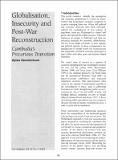| dc.contributor.author | Hendrickson, Dylan | en |
| dc.date.accessioned | 2016-02-01T13:59:40Z | |
| dc.date.available | 2016-02-01T13:59:40Z | |
| dc.date.issued | 01/04/2001 | en |
| dc.identifier.citation | Hendrickson, D. (2001) Globalisation, Insecurity and Post?War Reconstruction . IDS Bulletin 32(2): 98-106 | en |
| dc.identifier.issn | 1759-5436 | en |
| dc.identifier.uri | https://opendocs.ids.ac.uk/opendocs/handle/20.500.12413/8758 | |
| dc.description.abstract | Summaries This article examines, critically, the assumption thateconomic globalisation is a force for peace, security and broad?based economic prosperity in societies emerging from war. Cambodia's recent experiences illustrate how, in a weak political and legal environment, rapid marketisation can increase socio?economic insecurity for vulnerable groups. Furthermore, the introduction after 1993 of a model of post?war reconstruction emphasising the rapid restoration of macroeconomic stability exacerbated political tensions. Donors' emphasis on down?sizing the civil service ran counter to the key factor underpinning the stability of the first postwar coalition government. This was the agreement to integrate large numbers of functionaries from the two incoming parties into the national administrative and security apparatus. Cambodia's experiences suggest the need to embed post?war administrative and economic reforms in a broader strategy to strengthen political governance and restore socio?economic security. | en |
| dc.format.extent | 9 | en |
| dc.publisher | Institute of Development Studies | en |
| dc.relation.ispartofseries | IDS Bulletin Vol. 32 Nos. 2 | en |
| dc.rights.uri | http://www.ids.ac.uk/files/dmfile/IDSOpenDocsStandardTermsOfUse.pdf | en |
| dc.title | Globalisation, Insecurity and Post?War Reconstruction | en |
| dc.type | Article | en |
| dc.rights.holder | © 2001 Institue of Development Studies | en |
| dc.identifier.doi | 10.1111/j.1759-5436.2001.mp32002009.x | en |

